|
Books Should Be Free Loyal Books Free Public Domain Audiobooks & eBook Downloads |
|
|
Books Should Be Free Loyal Books Free Public Domain Audiobooks & eBook Downloads |
|
Poetry |
|---|
|
Book type:
Sort by:
View by:
|
By: Ameen Rihani (1876-1940) | |
|---|---|
 Chant of Mystics, and Other Poems
Chant of Mystics, and Other Poems
This is a volume of poetry by the influential Lebanese American author Ameen Rihani. In these poems, the author playfully introduces the American public of the early 1920's to the environment in which he grew up, embellishing the poems with folklore and fairy tale romance. - Summary by Carolin | |
By: Amy Levy (1861-1889) | |
|---|---|
 A London Plane-Tree, and Other Verse
A London Plane-Tree, and Other Verse
Amy Levy was a British poet and novelist who is celebrated for her feminist positions and her engagement with homosexual romance during the Victorian era. Levy wrote stories, essays, and poems for periodicals, some popular and others literary. Her writing career began early; her poem "Ida Grey" appearing in the journal, The Pelican, when she was only fourteen. Her final book of poems, A London Plane-Tree And Other Verse (1889), contains lyrics that are among the first to show the influence of French symbolism. (Introduction excerpted from Wikipedia) | |
By: Amy Lowell (1874-1925) | |
|---|---|
 Dome of Many-Coloured Glass
Dome of Many-Coloured Glass
This is a collection of lyrical poems, sonnets and verses for children by Amy Lowell."For quaint pictorial exactitude and bizarrerie of color these poems remind one of Flemish masters and Dutch tulip gardens; again, they are fine and fantastic, like Venetian glass; and they are all curiously flooded with the moonlight of dreams. . . . Miss Lowell has a remarkable gift of what one might call the dramatic-decorative. Her decorative imagery is intensely dramatic, and her dramatic pictures are in themselves vivid and fantastic decorations." (Richard Le Gallienne, 'New York Times Book Review', 1916) | |
 Men, Women and Ghosts
Men, Women and Ghosts
This is a collection of long poems and short stories by Amy Lowell. | |
By: Anacreon (582 BCE-485 BCE) | |
|---|---|
 Ode 7
Ode 7
volunteers bring you 19 recordings of Ode 7 by Anacreon, translated by Sir Thomas Moore. This was the Weekly Poetry project for August 14, 2022. ----- The more things change, the more they stay the same. Written sometime around 500 BC, this little poem expresses the desire to live life to the fullest with the time one has left. Here's to gray hair and the autumn of one's life! - Summary by TriciaG | |
By: Andrew B. Paterson | |
|---|---|
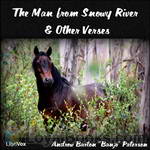 The Man from Snowy River and other Verses
The Man from Snowy River and other Verses
A collection of poems by Australian poet Andrew Barton ‘Banjo’ Paterson, picturesque glimpses into life in the Bush. From the preface: “A number of these verses are now published for the first time, most of the others were written for and appeared in ‘The Bulletin’ (Sydney, N.S.W.), and are therefore already widely known to readers in Australasia.” | |
 Bush Debate
Bush Debate
In 1892, two of Australia's best poets came up with a scheme to make some money. They arranged to have an argument in the Weekly Bulletin, and since they were being paid by the word, this let them fire back and forth, being sent beer money with each salvo. A couple of other poets also joined in, and their work is seminal to the development of the Bush ethos in Australia. The first eight files are the original form of the poems, and the second eight are later republications by the authors, in their own collections. | |
By: Andrew Barton Paterson (1864-1941) | |
|---|---|
 Our Mat
Our Mat
volunteers bring you 15 recordings of Our Mat by A. B. Paterson. This was the Weekly Poetry project for July 14, 2019. ------ Banjo Paterson's speculations on a piece of prison craft. This poem references The Darlinghurst Gaol, a former Australian prison located in Darlinghurst, New South Wales. Australian poet Henry Lawson spent time incarcerated there during some of the turbulent years of his life and described the gaol as Starvinghurst Gaol due to meagre rations given to the inmates. It was closed in 1914 and has subsequently been repurposed to house the National Art School. | |
 Mountain Station
Mountain Station
volunteers bring you 12 recordings of A Mountain Station by Andrew Barton 'Banjo' Paterson. This was the Fortnightly Poetry project for April 4, 2021. ------ Andrew Barton "Banjo" Paterson, CBE was an Australian bush poet, journalist and author. He wrote many ballads and poems about Australian life, focusing particularly on the rural and outback areas, including the district around Binalong, New South Wales, his "Waltzing Matilda" is regarded widely as Australia's unofficial national anthem. This poem is taken from The Man from Snowy River and Other Verses by Andrew Barton 'Banjo' Paterson. - Summary by Wikipedia | |
 Not on It
Not on It
volunteers bring you 17 recordings of Not on It by Andrew Barton Paterson. This was the Weekly Poetry project for April 12, 2020. ------ This Weekly Poem is from the original collection SALTBUSH BILL, J.P., AND OTHER VERSES, which includes 43 poems by the author that are reprinted from various sources. The book formed part of the publisher's series of "Pocket Editions for the Trenches", designed to fit a serviceman's coat pocket. | |
By: Andrew Lang (1844-1912) | |
|---|---|
 Blue Poetry Book
Blue Poetry Book
This anthology poetry, gathered by Andrew Lang and originally published in 1891, is read by four voices, Larry Wilson, Ciufi Galeazzi, Lynette Caulkins and J. Thurgood. | |
 Romance
Romance
LibriVox volunteers bring you 16 readings of Romance by Andrew Lang, probably best known as Edward Elgar's song My Love Dwelt in a Northern Land. Interestingly, Lang initially refused permission for his words to be used as lyrics, and Elgar's wife Alice wrote alternative words Afar, amidst the Sunny Isles for the song. However, Lang later relented and gave permission for his poem to be used. The poem was initially published in The Century Magazine, May 1882, and this is the version recorded here. Later collections of Lang's poetry omit the third verse. | |
By: Andrew Marvell (1621-1678) | |
|---|---|
 To His Coy Mistress (version 2)
To His Coy Mistress (version 2)
Andrew Marvell was an English metaphysical poet, satirist and politician who sat in the House of Commons at various times between 1659 and 1678. During the Commonwealth period he was a colleague and friend of John Milton. His poems range from the love-song "To His Coy Mistress", to evocations of an aristocratic country house and garden in "Upon Appleton House" and "The Garden", the political address "An Horatian Ode upon Cromwell's Return from Ireland", and the later personal and political satires "Flecknoe" and "The Character of Holland". - Summary by Wikipedia | |
By: Ann Hawkshaw (1812-1885) | |
|---|---|
 Dionysius the Areopagite, with other poems
Dionysius the Areopagite, with other poems
An early figure in the birth of poetry in industrial Manchester, Ann Hawkshaw published three collections and another was circulated privately. Her first collection. published in Manchester and London in 1842, begins with an epic poem, Dionysius the Areopagite. Based on the New Testament story of the conversion of Dionysius by St Paul, much of the poem centres on the consequences of Dionysius' conversion for his betrothed, Myra, and her sister, Corrina. The collection also includes two of Hawkshaw's most important works, The Past and The Future, and a number of shorter poems on themes of history, loss and faith. | |
 Poems for my Children
Poems for my Children
Published in 1847, five years after her epic poem, 'Dionysus the Areopagite', 'Poems For My Children' was Ann Hawkshaw's second collection of poetry. The poems are dedicated to her six children and many are written in an intimate conversational style. 'Ada', the final poem in the collection, is a memorial for her second child, who had died of hydrocephalus shortly before her fifth birthday. Five historical poems, set in the times of the Druids, the Romans the Saxons, the Normans and the Crusades, punctuate the collection and anticipate her later collection, 'Sonnets on Anglo-Saxon History'. | |
By: Ann Radcliffe (1764-1823) | |
|---|---|
 EDWY: A Poem, in Three Parts
EDWY: A Poem, in Three Parts
In Edwy, Ann Radcliffe gives us a delightful piece of poetic moonshine, whose eponymous hero seeks assistance from the world of faerie in order to spy on his girlfriend, Aura, and see if she really loves him. He does this by venturing unseen into Windsor Forest at night to trap the love-fay, Eda, who, once spellbound, must reveal all and let him remotely view Aura's activities by means of a magic mirror cut from crystal. In addition to this early form of cyberstalking, Edwy, on his night-journey into the forest gets to witness a royal procession of the Fairie Queen, followed by midnight revels of elves and spirits... | |
By: Anna Hempstead Branch (1875-1937) | |
|---|---|
 Mother's Song
Mother's Song
volunteers bring you 16 recordings of A Mother's Song by Anna Hempstead Branch. This was the Fortnightly Poetry project for May 3, 2020. ------ A tribute to Mothers everywhere. Taken from The shoes that danced, and other poems by Anna Hempstead Branch, - Summary by David Lawrence | |
By: Anna Katharine Green (1864-1935) | |
|---|---|
 Defence of the Bride and Other Poems
Defence of the Bride and Other Poems
Anna Katharine Green is now best-known for her popular mystery and detective stories, but she also wrote some excellent poetry. | |
 At the Piano
At the Piano
Anna Katharine Green was an American poet and novelist. She was one of the first writers of detective fiction in America and distinguished herself by writing well plotted, legally accurate stories. Green has been called "the mother of the detective novel". - Summary by Wikipedia | |
By: Anne Kingsmill Finch (1661-1720) | |
|---|---|
 Apology
Apology
Anne Finch, Countess of Winchilsea, was an English poet, the third child of Sir William Kingsmill of Sydmonton Court and his wife, Anne Haslewood. She was well-educated as her family believed in good education for girls as well as for boys. In her works Finch drew upon her own observations and experiences, demonstrating an insightful awareness of the social mores and political climate of her era. But she also artfully recorded her private thoughts, which could be joyful or despairing, playful or despondent. The poems also revealed her highly developed spiritual side. | |
By: Anne Lynch Botta (1815-1891) | |
|---|---|
 Thoughts in a Library
Thoughts in a Library
volunteers bring you 24 recordings of Thoughts in a Library by Anne Lynch Botta. This was the Weekly Poetry project for March 28, 2021. ------ Anne Charlotte Lynch Botta was an American poet, writer, teacher and socialite whose home was the central gathering place of the literary elite of her era. - Summary by Wikipedia | |
By: Anne Wales Abbott ed. (1808-1908) | |
|---|---|
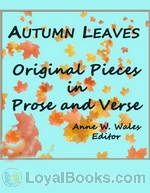 Autumn Leaves, Original Pieces in Prose and Verse
Autumn Leaves, Original Pieces in Prose and Verse
The pieces gathered into this volume were, with two exceptions, written for the entertainment of a private circle, without any view to publication. The editor would express her thanks to the writers, who, at her solicitation, have allowed them to be printed. They are published with the hope of aiding a work of charity,—the establishment of an Agency for the benefit of the poor in Cambridge,—to which the proceeds of the sale will be devoted. | |
By: Anonymous | |
|---|---|
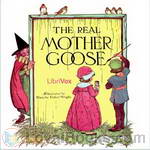 The Real Mother Goose
The Real Mother Goose
A heartwarming collection of nursery rhymes that will take you back to your childhood! | |
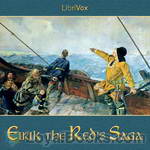 Eirik the Red's Saga
Eirik the Red's Saga
In this saga, the events that led to Eirik the Red’s banishment to Greenland are chronicled, as well as Leif Eirikson’s discovery of Vinland the Good (a place where wheat and grapes grew naturally), after his longboat was blown off-course. By geographical details, this place is surmised to be present-day Newfoundland, and is likely the first European discovery of the American mainland, some five centuries before Christopher Columbus’s journey. | |
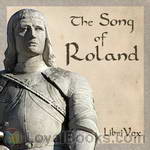 The Song of Roland
The Song of Roland
The Song of Roland is an epic poem, originally sung in Old French. It tells the story of the Battle of Roncevaux Pass in 778. This is an English translation. Translated by Charles Kenneth Scott-Moncrieff. | |
 Santa Claus, Kriss Kringle or St. NIcholas
Santa Claus, Kriss Kringle or St. NIcholas
volunteers bring you 14 recordings of Santa Claus, Kriss Kringle or St. NIcholas by Anomymous. This was the Fortnightly Poetry project for December 16, 2018. ------ This poem was published in booklet form with illustrations in 1897. - Summary by David Lawrence | |
 Merry Christmas : two early birds
Merry Christmas : two early birds
volunteers bring you 11 recordings of A Merry Christmas : two early birds by anonymous. This was the Weekly Poetry project for December 11. 2018. ------ This Christmas pamphlet, dated 1890, from The Mail and Empire, a Toronto newspaper, solicits Christmas donations for the newspaper delivery boys. - Summary by David Lawrence | |
 Please Buy My Verses
Please Buy My Verses
volunteers bring you 10 recordings of Please Buy My Verses by Anonymous. This was the Weekly Poetry project for November 18, 2018. ------ PLEASE BUY MY VERSES. PRICE: WHAT YOU PLEASE The Bearer Lost His Eyesight While Blasting in December, 1868. - Summary by text | |
By: Anthony Munday (1560? -1633) | |
|---|---|
 Sir Thomas More
Sir Thomas More
Sir Thomas More is a collaborative Elizabethan play by Anthony Munday and others depicting the life and death of Thomas More. It survives only in a single manuscript, now owned by the British Library. The manuscript is notable because three pages of it are considered to be in the hand of William Shakespeare and for the light it sheds on the collaborative nature of Elizabethan drama and the theatrical censorship of the era. The play dramatizes events in More's life, both real and legendary, in an episodic manner in 17 scenes, unified only by the rise and fall of More's fortunes. | |
By: Aristotle (384-322 BC) | |
|---|---|
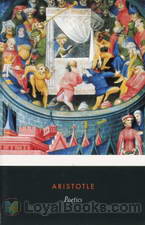 Poetics
Poetics
Aristotle’s Poetics from the 4th century B.C. aims to give a short study of storytelling. It discusses things like unity of plot, reversal of situation, and character in the context of Greek tragedy, comedy and epic poetry. But it still applies today. It is especially popular with screenwriters as seen in many script gurus’ how-to books. | |
By: Arthur Hugh Clough (1819-1861) | |
|---|---|
 Say Not the Struggle Naught Availeth
Say Not the Struggle Naught Availeth
Arthur Hugh Clough (kluf) was an English poet, an educationalist, and the devoted assistant to ground-breaking nurse Florence Nightingale. He was the brother of suffragist Anne Clough, who became principal of Newnham College, Cambridge. | |
By: Arthur Macy (1842-1904) | |
|---|---|
 Five Senses
Five Senses
Arthur Macy was a Nantucket boy of Quaker extraction. His name alone is evidence of this, for it is safe to say that a Macy, wherever found in the United States, is descended from that sturdy old Quaker who was one of those who bought Nantucket from the Indians, paid them fairly for it, treated them with justice, and lived on friendly terms with them. In many ways Arthur Macy showed that he was a Nantucketer and, at least by descent, a Quaker. He often used phrases peculiar to our island in the sea, and was given, in conversation at least, to similes which smacked of salt water... | |